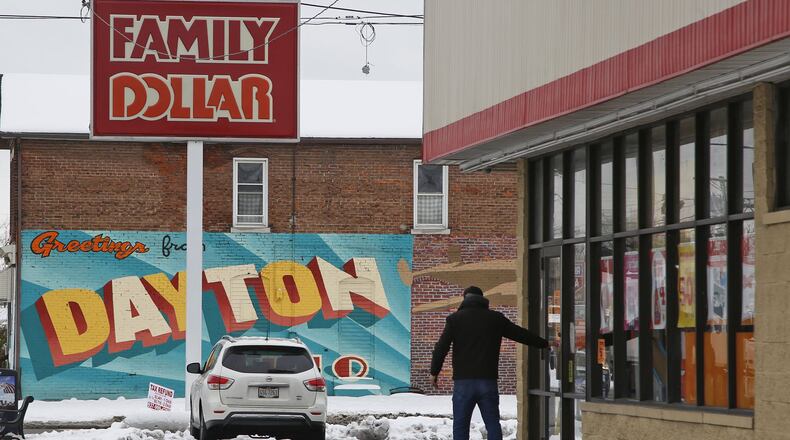A Tennessee developer wants to build a 9,100-square-foot Dollar General at 3129 E. Third St., which today is an empty lot. A grocery store on that site, Food For Less, was destroyed by fire in November 2017.
A new Dollar General would help the area because it is a food desert and the chain sells some packaged foods, said Nicole Adkins, executive director of With God’s Grace, an East Dayton mobile food pantry.
MORE: Dayton commission opposes alcohol sales at Family Dollar stores
But Adkins says a dollar store could not replace a full-service grocery store. While some residents in the area say the proposal will bring back at least some offerings, other neighbors are still hoping a full-service store returns.
“Dollar General is not going to solve the problem in the east end for groceries,” said Lodia Furnas, president of the Burkhardt-Springfield Neighborhood Association.
Dollar stores often don’t have many fresh foods, but residents are likely to food shop there anyway because they are close by when residents don’t have cars and can’t easily get to full-service grocery stores, Furnas said.
Dollar Tree and Family Dollar stores provide an affordable and convenient fill-in shopping option for their customers between their weekly or bi-weekly grocery store trips, said Kayleigh Painter, a Dollar Tree spokeswoman.
“Some of our customers are under-served in certain markets we operate in,” she said. “We open stores in markets where we can best serve our customers.”
MORE: The No. 1 threat to dollar stores
The Family Dollar on East Third Street has some food items, but most are frozen goods, canned foods, breads and snacks like chips and nuts.
The proposed Dollar General site in east Dayton is less than half a mile from a Family Dollar store at 2601 E. Third St. There are five Family Dollars, three Dollar Generals and one Dollar Tree within about three miles of the site.
“Dollar stores may do more harm than good,” said former U.S. Congressman and Ambassador Tony Hall, founder of the Hall Hunger Initiative. “They go into low-income areas and provide little in the way of fresh food, and they just kill little, independent grocery stores.”
MORE: Dollar General, Dollar Tree to open more local stores
The United States now has more dollar stores than it has McDonald’s and Starbucks combined.
Painter said Dollar Tree and Family Dollar have healthy food options and the products they offer are based on customer preferences as well as local and regional needs.
However, the stores can make it difficult for residents to consume a healthy diet full of fruits and vegetables, said Haley Carretta, food systems project manager with Public Health — Dayton and Montgomery County.
Dollar stores primarily offer “shelf stable” and packaged foods and usually do not have fresh vegetables, fruits or meats, she said.
Consumables account for about 50 percent of Dollar Tree sales and 75 percent at Family Dollar, a spokesperson said. Consumables include candy, food, household paper and chemicals and cosmetic, health and beauty products.
Hall believes that residents have lost access to affordable and quality foods because dollar stores have replaced independent grocery stores in low-income neighborhoods.
Dollar stores sell lower-quality foods than grocery stores, sometimes at higher prices, Hall said. Dollar stores sell some goods in smaller packages, which only creates the illusion they are cheaper, some researchers say.
Hall said he thinks local community leaders need to take a look at the spread of dollar stores and figure out if they hurting low-income areas.
“I think it’s an issue that people don’t think about,” he said. “It’s an issue that our community leaders ought to take a look at. … They can do some harm.”
MORE: Dollar General to open 900 new stores in 2018
Last year, the City Council in Tulsa, Okla., passed legislation requiring small box discount stores to be at least one mile apart. City leaders in New Orleans, La., have talked about imposing a moratorium on small box stores and discount retailers.
Ohio had about 1,492 Dollar Tree, Family Dollar and Dollar General stores in 2018, which ranked the state 13th in the nation for dollar stores per capita, said Marie Donahue, a research associate with the community-scaled economy initiative with the Institute for Local Self-Reliance.
The state has about 1.2 stores for every 10,000 residents in the state, and dollar stores in the state are growing their share of the grocery market, said Donahue, who did research on dollar stores that gained national attention.
MORE: Discount retailer Dollar General plans nearly 1K new stores
Dollar Tree and Dollar General plan to continue their aggressive growth.
A Dollar Trees spokesperson said the company has identified the opportunity for 26,000 stores across North America.
Dollar General has more than 15,225 stores across 44 states and has been rapidly adding new locations.
In the first three quarters of 2018, Dollar General opened 750 new stores.
Dollar Tree said it plans to open 350 new Dollar Tree and 200 new Family Dollar stores in fiscal year 2019, according to its most recent earnings report. Last month, this newspaper reported that Dollar General plans to open about 975 stores in 2019.
Some local residents are very loyal dollar store customers and believe serve areas that other businesses won’t consider and offer affordable products to poor and working-class people.
When a Dollar Tree on Wayne Avenue closed in late 2016 after being badly damaged by fire, local residents scribbled and posted notes on the front door of the business urging it to reopen.
“Yes, please reopen!” wrote Brian Hoeflich, who lived near the store. “This neighborhood needs you badly!”
The store eventually was rebuilt and reopened.
About the Author

